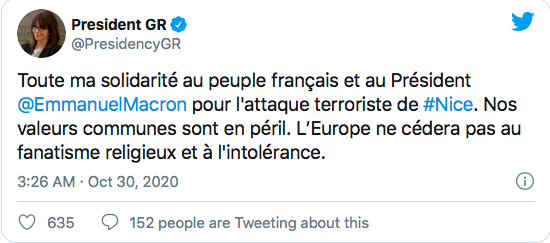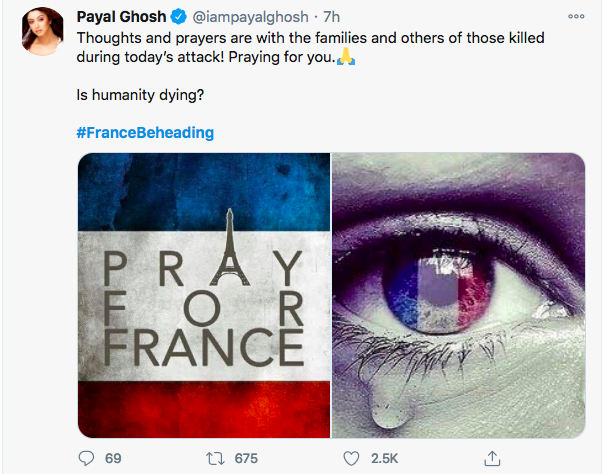“Europe will not surrender to religious fanaticism and intolerance,” Greek President Katerina Sakellaropoulou said in a social media post on Thursday, expressing support for the French people in the wake of what is being treated as a religiously motivated deadly knife attack in the town of Nice.
Expressing “solidarity with the people of France and French President Emmanuel Macron over the terrorist attack in Nice,” Sakellaropoulou said in a Twitter post that Europe’s “common values are at risk.”

The Greek president’s message came after three people were killed by a lone assailant in Nice’s Notre-Dame Basilica on Thursday. Macron described the incident as an “Islamist terrorist attack.”
According to reports, the assailant, who was shot and taken into custody, has been identified as a 21-year-old Tunisian man who arrived in France at the start of the month via Lampedusa in Italy.
What we know so far about the attack
More details are emerging about the Nice attack. Here’s what we know right now:
The incident
Three people were killed in Nice, southern France, during a knife attack at the Notre Dame Basilica, the city’s main church.
Videos posted on social media showed police and military officers responding to the incident, setting up a cordon in the city center.
The victims
One of the victims had her throat slit, a police source told CNN. The mayor of Nice had earlier described it as a decapitation. Another victim – a man – died following multiple stabbings, according to the police source. The third victim, a woman, was wounded inside the church, but managed to leave. However, she died in a nearby café, the police source said.
The suspect
French national police named the attack’s suspect as Brahim Aouissaoui, born in 1999. A source in the Italian interior ministry told CNN that Aouissaoui first arrived in Europe on the southern Italian island of Lampedusa.
Nice’s mayor Christian Estrosi said the attacker was shot by police, but is still alive and has been taken into custody.
Estrosi said “everything points” to the incident being a terrorist attack, and France’s anti-terrorism prosecutor has taken over the investigation.

The reaction
French President Emmanuel Macron said the country will not give in to terrorism after once again coming under attack from what he called “Islamist and terrorist madness,” he said after visiting the scene of a deadly attack. The country’s terror alert level was raised to “emergency” following the incident.
International leaders have pledged solidarity with France, with the heads of Spain, Italy, Turkey, the UK and the European Parliament among those condemning the violence. The Vatican said Pope Francis is praying for victims. “Terrorism and violence can never be accepted,” it said in a statement.
The French Council of the Muslim Faith has also condemned the incident; as did the French Bishop’s Council, which said Catholics across France “refuse to give into fear” following the attack.
Authorities in Saudi Arabia, the United Arab Emirates and Egypt’s highest religious authority Al-Azhar have condemned the deadly knife attack in France on Thursday.
The Turkish government’s communications director, Fahrettin Altun, also condemned the attack but criticized the French leadership saying they should avoid inflammatory rhetoric against Muslims. Tensions have been tense between the two countries, with Turkey particularly critical of treatment of Muslims in France.
The background
The incident is the latest in a number of attacks to hit France in recent years, and comes less than two weeks after the beheading of teacher Samuel Paty in Paris. Paty was targeted after he used caricatures of Islam’s Prophet Muhammad during a lesson.
Nice has been the target of terror in the past. In 2016 dozens died after an ISIS-inspired attacker plowed a 20-ton truck into Bastille Day crowds.
